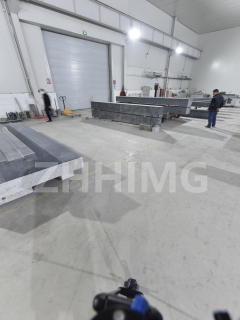As PCB (Printed Circuit Board) drilling and milling machines have become increasingly popular in today's electronics industry, the selection of suitable materials for their components has become an essential factor in ensuring their stability and durability. Among the various materials that can be used for PCB drilling and milling machine components, granite has proven to be one of the most reliable and cost-effective choices.
Granite is a type of natural stone that is widely used in construction and engineering projects due to its excellent mechanical properties, durability, and aesthetic appeal. In the context of PCB drilling and milling machines, granite is valued for its high stiffness, low thermal expansion coefficient, and excellent vibration-damping abilities. These characteristics make granite an ideal choice for the machine's worktable, base, and columns.
Here are some reasons why granite is the preferred choice for PCB drilling and milling machine components:
1. High precision and stability
Granite has a high level of dimensional stability due to its low thermal expansion coefficient. This property allows for precise positioning and alignment of drill bits and milling tools. Moreover, granite has a high level of stiffness that helps to minimize the deformations caused by the machining process, resulting in greater accuracy and consistency.
2. Excellent vibration damping
Granite has excellent vibration damping properties, which make it suitable for applications where stability is critical. For PCB drilling and milling machines, granite's damping ability helps to reduce vibrations caused by the high-speed rotation of the spindle and the cutting forces generated by the machining process. This leads to improved surface finish, reduced tool wear, and longer machine life.
3. Cost-effective and easy to maintain
Compared to other materials like cast iron and steel, granite is relatively inexpensive and requires minimal maintenance. Its resistance to abrasion and chemical damage means that it can withstand the harsh conditions of the machining environment without degrading or corroding over time. Additionally, granite's non-porous surface makes it easy to clean and sanitize, which helps to ensure the accuracy of the machining process.
In conclusion, choosing granite as the component material of PCB drilling and milling machines is a smart decision for manufacturers who want to ensure high precision, stability, and durability. Its inherent mechanical properties make it an ideal material for the machine's worktable, base, and columns. Furthermore, its cost-effectiveness and low maintenance requirements make it a cost-effective choice that is easy to maintain over the machine's life cycle.
Post time: Mar-15-2024

